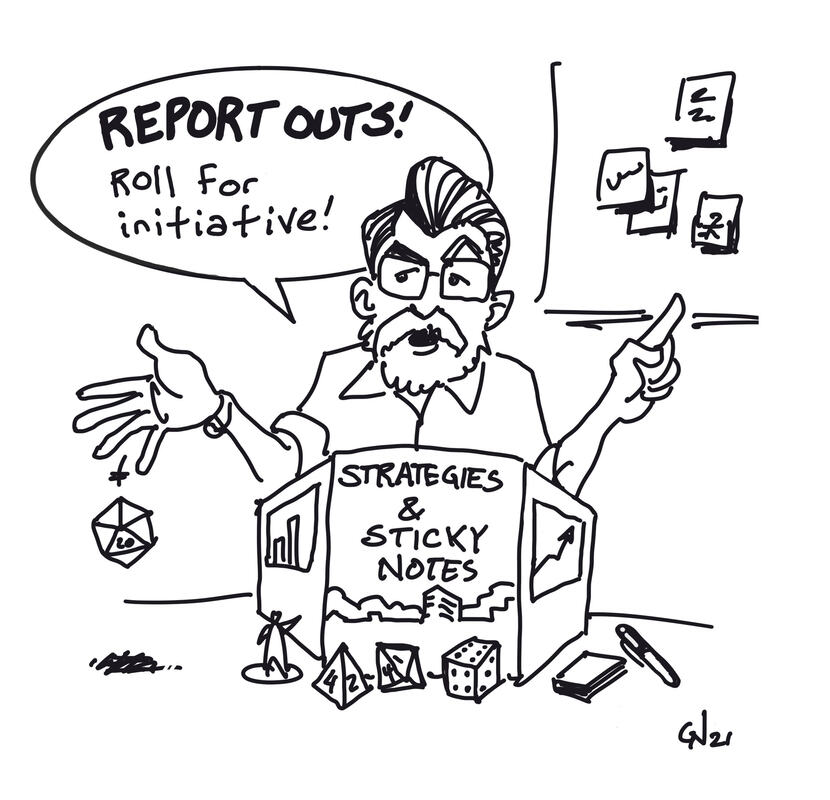|
Guest blog post by Geoffrey Nelson, M Ed. When I discovered Dungeons and Dragons (D&D) in the fifth grade, I fell hard in love. The funky box art, the spooky dice, the idea of a story lived and a world discovered through the power of pure imagination, all took me in and never let go. Through Dungeons and Dragons, people like me began creating outstanding virtual experiences for their friends long before Zoom, the internet, and even personal computers were part of daily life. Dungeons and Dragons was first published in 1974. It disrupted the toy and game space and became the best-selling toy of 1978, despite having no board, no pieces, and no winner. It also flew in the face of the emerging trend in video games. Pong had just arrived and it seemed that digital games tethered to TV sets were the future. D&D wasn’t about winning or losing or technology. It was about fellowship and story-making. It was VR before VR was cool. A shared virtual experience doesn’t live on a screen or a cloud server; it lives in the minds of the participants. They cast visions together with their super-power of conceptualizing the unknown and unseen. Their ability to collectively imagine creates unique interactive and problem-solving opportunities. Truly virtual experiences provide a sense of agency. When participants cannot affect change through meaningful choices, their experience is passive and vicarious, not virtual. Engagement, investment, and synthesis characterize optimal virtual experiences. In D&D, the participants’ choices shape their outcomes. The Dungeon Master (DM) describes the setting and situations, but the players decide the actions of their player characters (PC’s). What emerges is a memorable, enjoyable, virtual adventure. A good D&D session is a highly curated experience. The DM considers lighting, sound, and insists on the all-in presence of the players. Everything the DM does is intentional and aimed at immersing everyone deeply in the virtual world. Distractions must be minimized; table rules for players’ behavior are as important as the rules of the game. Cell phones in a basket, people! There’s no texting in the Fever Swamp. To be a good DM, you must be a rules expert, a compelling narrator, and a master of description. As the rules expert, you need to know how the game works: what the characters can reasonably do, what they absolutely cannot do, and how to determine the outcomes of their decisions. What makes D&D a game as opposed to a cooperative storytelling exercise is the welcome element of uncertain outcomes. Just as in facilitation, the DM knows the rules of the game but not how it will turn out. The more a DM invests in a particular outcome, the less meaningful players’ choices are. Without the skill and courage to manage agency and uncertainty, virtual experiences are boring at best and destructive or divisive at worst. To help the participants make the most of their agency, the DM must master skillful narration. Good DMs optimize the pace and momentum of the game through their narration of action, reaction, and consequences. Players lose focus and act silly or nihilistic when they are out of the spotlight for too long or the narration feels irrelevant. The DM solves this by keeping narrations short and vivid. Once a players’ turn is resolved, the DM focuses on the next player. Quick summaries, frequent reminders of critical information, and occasional over-cuing are tools DM’s use to keep the game moving forward. Just because the DM doesn’t know what the players will do, she must imagine what they might do. DMs should visualize various outcomes before the gaming session to anticipate what the players may need next. The RPG luminary Hankerin Ferinale creates binary nodes at critical decision points: if A, then B happens; if C, then D happens. Thinking ahead and planning for both success and failure won’t provide an exact answer for whatever the players choose. It will provide a set of options that combines and synthesizes with new information to create the next adventure node. Finally, the DM must master the art of succinct, evocative description. This isn’t action-focused narration or storytelling, which resolves a question. Resolving questions is for the players; The DM’s job is to evoke a shared story-space full of meaningful choices. The story emerges as the participants engage with these choices. With the focus on surfacing critical content, the DM must make situations as clear as possible: what are the stakes, what are the dangers, and what resources are available? By describing just the right details to bring the environment and situations to life, DMs enhance essential player agency. The quality of a D&D session can be measured by how vividly and fondly the players remember it. They will carry the experience with them, reminiscing about defeating the red dragon or the zombie invasion. They may make art or write stories about their adventures. Their real-life behavior may reflect something they’ve learned through play. These are responses to deeply engaging and impactful experiences. Learn the lessons of great DMs to shape your facilitation clients’ online experiences:
Follow these guidelines and your clients will be able to bravely and mindfully engage their challenges, and their virtual experience will be memorable and valuable. They will be heroes in a shared story and enjoy the riches of the highest outcomes.
15 Comments
|
Details
ABOUT THE AuthorJoran Slane Oppelt is an international speaker, author and consultant with certifications in coaching, storytelling, design thinking and virtual facilitation. Archives
March 2024
Categories
All
|



 RSS Feed
RSS Feed